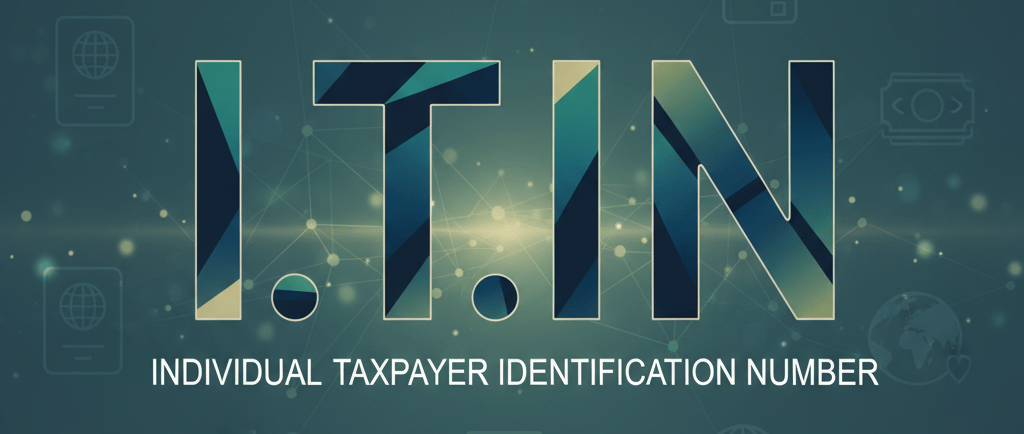Individual Taxpayer Identification Number (ITIN): A Professional Guide
Blog post description.


Need an ITIN?
The Individual Taxpayer Identification Number (ITIN) is essential for individuals who are required to comply with U.S. tax laws but are not eligible for a Social Security Number. Whether you are filing a tax return, claiming dependents, receiving U.S. income, or meeting other compliance requirements, having the right guidance ensures a smooth process. Our team can assist you with preparing the application and certifying your documents through a Certified Acceptance Agent (CAA), helping you avoid delays and keep your information secure.
Individual Taxpayer Identification Number (ITIN): A Professional Guide
The U.S. tax system requires all individuals with a filing or reporting obligation to have a valid Taxpayer Identification Number (TIN). While U.S. citizens and authorized residents generally use a Social Security Number (SSN), many individuals do not qualify for one. For these cases, the Internal Revenue Service (IRS) issues the Individual Taxpayer Identification Number (ITIN).
This article provides a comprehensive overview of ITIN, its purpose, eligibility, application process, and renewal requirements.
What is an ITIN?
An Individual Taxpayer Identification Number (ITIN) is a tax processing number issued by the IRS. It is a nine-digit number, formatted like an SSN (XXX-XX-XXXX), but always beginning with the number 9.
The ITIN is one of the taxpayer identification numbers recognized in the U.S. and is specifically intended for individuals who are required to comply with U.S. tax laws but are not eligible for a Social Security Number.
Who Needs an ITIN?
An ITIN is required by individuals who must file or report taxes in the United States but cannot obtain an SSN. Common scenarios include, but are not limited to:
Nonresident aliens required to file a U.S. federal tax return.
Resident aliens under U.S. tax law who need to file but are not eligible for an SSN.
Dependents and spouses of U.S. citizens or resident aliens who cannot obtain an SSN.
Dependents and spouses of nonresident aliens on certain visa categories.
Individuals claiming tax treaty benefits.
Foreign nationals with U.S. income or reporting requirements (e.g., opening an interest-bearing bank account, receiving U.S. investment income, or meeting certain withholding requirements).
Other circumstances where a taxpayer identification number is required for U.S. tax compliance, financial reporting, or documentation purposes.
In short, an ITIN is necessary for anyone who has a U.S. tax filing or reporting obligation but is not eligible for a Social Security Number.
Documentation Required for ITIN Application
The documents required for an ITIN application vary depending on the reason for applying and the applicant’s individual circumstances. The IRS requires proof of both identity and foreign status, and the exact documentation can differ for dependents, spouses, students, or other applicants.
The most commonly accepted document is a valid, unexpired passport, as it satisfies both identity and foreign status requirements.
Other documents that may be accepted (depending on the situation) include:
National identification card (must include name, photo, address, date of birth, and expiration date)
Birth certificate (especially for dependents under 18 if a passport is not provided)
U.S. or foreign driver’s license
Foreign voter’s registration card
U.S. or foreign military ID card
Other government-issued documents containing verifiable identity details
Since the documentation depends on the applicant’s category and purpose for applying, the IRS provides specific guidance for each situation. Most applicants rely on a Certified Acceptance Agent (CAA) to ensure that the correct documents are certified and submitted properly.
Application Process
The ITIN application process involves three key steps:
Complete Form W-7 – the official ITIN application form.
Prepare supporting documentation – proof of identity and foreign status as outlined above.
Submit the application through one of the following methods:
Certified Acceptance Agent (CAA): Authorized by the IRS to verify documents and certify applications, eliminating the need to mail original identification documents.
By mail: Form W-7 and supporting documents can be mailed directly to the IRS.
In person: Select IRS Taxpayer Assistance Centers accept ITIN applications by appointment.
Working with a CAA is generally preferred as it provides a secure, accurate, and efficient application process.
Expiration and Renewal of ITIN
ITINs are not permanent and may expire. Key rules include:
Three-year rule: An ITIN will expire if it has not been used on a federal tax return for three consecutive years.
IRS expiration cycles: The IRS may announce expiration schedules based on the ITIN’s middle digits.
Renewal:
Taxpayers must file Form W-7 again, checking the renewal option.
The same identity and foreign status documents are required.
Renewal before filing a tax return is strongly recommended to avoid delays in processing or refunds.
Importance of ITIN
While the ITIN does not provide work authorization or eligibility for Social Security benefits, it plays a critical role in tax compliance and related financial activities. It enables:
Filing of U.S. tax returns when required.
Claiming of dependents and applicable tax credits.
Compliance with U.S. tax withholding rules.
Opening of certain financial accounts or investments that require a TIN.
Conclusion
The ITIN is an essential element of the U.S. tax system, ensuring that individuals without a Social Security Number can still comply with federal tax laws. Proper application, timely renewal, and accurate documentation are crucial to maintaining compliance and avoiding delays in processing.
For individuals who fall under ITIN requirements, working with a Certified Acceptance Agent provides a secure and reliable way to complete the process while safeguarding important identification documents.
Looking for step-by-step details?
Visit our ITIN FAQ page for a complete list of required documents, application steps, and helpful resources.